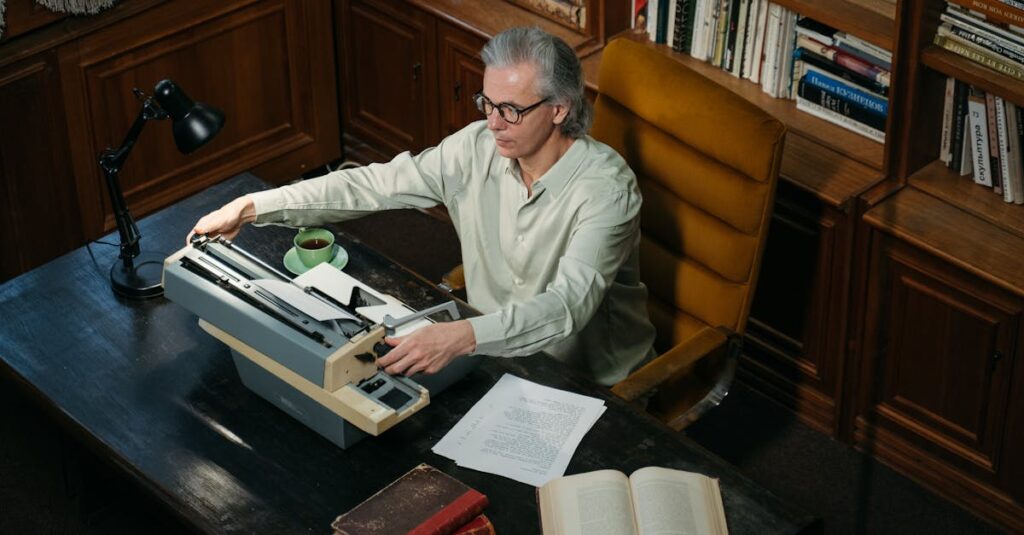As a writer and literary enthusiast, I’ve always admired Brown University’s prestigious MFA Creative Writing program for its exceptional approach to nurturing literary talent. Located in Providence Rhode Island this two-year program stands out as one of the most selective and distinguished creative writing programs in the nation.
I’m constantly amazed by how Brown’s MFA program combines intensive workshops with literary seminars creating an environment where emerging writers can truly flourish. The program’s commitment to providing full funding to all accepted students along with its impressive faculty roster including award-winning authors makes it a dream destination for aspiring writers. Whether you’re passionate about fiction poetry or digital language arts Brown’s program offers specialized tracks that’ll help shape your unique creative voice.
Key Takeaways
- Brown’s MFA Creative Writing program is a highly selective two-year program offering specializations in Fiction, Poetry, and Digital Language Arts
- All admitted students receive full funding including tuition remission ($64,898) and an annual stipend ($25,000), plus teaching opportunities starting in their second semester
- The program features small workshop sizes (8-10 students), intensive faculty mentorship, and a curriculum requiring 8 workshops and 4 elective courses over two years
- Notable faculty includes award-winning authors, and the program boasts successful alumni like Ottessa Moshfegh and Ben Lerner
- Students gain access to extensive publishing opportunities through partnerships with leading literary journals and receive career support through industry connections
- Located in Providence, Rhode Island, the program offers dedicated writing spaces, technology resources, and engagement with a vibrant literary community
Brown University MFA Creative Writing

Brown University’s Literary Arts Program stands as a cornerstone of contemporary creative writing education, offering an intensive two-year Master of Fine Arts degree that emphasizes artistic innovation and interdisciplinary exploration.
Program Structure and Duration
The MFA program operates on a focused two-year curriculum with 8-10 students per genre. Students complete 8 workshops, 4 elective courses in literature or other disciplines, plus a thesis preparation course. Each semester includes:
- 2 graduate writing workshops focused on manuscript development
- 1 elective course examining contemporary or historical literary works
- Cross-genre experimentation opportunities between fiction, poetry & digital arts
- Individual studio time for independent writing projects
Faculty and Mentorship Opportunities
The program features direct mentorship from acclaimed faculty members, including:
| Faculty Member | Notable Works/Awards |
|---|---|
| Colin Channer | “”Providential”” – Poetry Collection |
| Laird Hunt | PEN/Faulkner Award Finalist |
| Sawako Nakayasu | PEN Award for Poetry in Translation |
| Monica Youn | National Book Award Finalist |
- One-on-one manuscript consultations each semester
- Weekly office hours with core faculty members
- Collaborative projects with visiting writers & artists
- Professional development guidance for publishing & teaching
- Access to Brown’s extensive literary arts network
Creative Writing Concentrations at Brown
Brown University’s MFA program offers three distinct creative writing concentrations, each designed to cultivate specialized expertise in specific literary forms. The program’s structure allows students to focus intensively on their chosen genre while maintaining opportunities for cross-genre exploration.
Fiction Track
The Fiction Track emphasizes narrative craft through intensive workshops focused on short stories novels. Students engage in detailed manuscript analysis guided by faculty members like Colin Channer Laird Hunt. The curriculum includes:
- Advanced narrative techniques in plot structure character development
- Contemporary fiction studies examining diverse storytelling approaches
- Individual mentorship sessions with published authors
- Opportunities to experiment with various prose forms including flash fiction novellas
Poetry Track
The Poetry Track combines traditional poetic forms with contemporary experimental practices led by distinguished poets like Sawako Nakayasu Monica Youn. The concentration features:
- In-depth study of prosody metrics versification
- Workshops exploring lyric narrative experimental forms
- Cross-media poetry projects incorporating visual sound elements
- Regular poetry readings critiques with visiting writers
- Electronic literature programming for writers
- Interactive narrative design development
- Multi-modal storytelling across digital platforms
- Collaborative projects combining text code visual elements
| Track Features | Fiction | Poetry | Digital Language Arts |
|---|---|---|---|
| Core Workshops | 4 | 4 | 4 |
| Studio Hours | 12-15 | 12-15 | 12-15 |
| Tech Components | Optional | Optional | Required |
| Performance Elements | Limited | Regular | Integrated |
Program Requirements and Curriculum
Brown University’s MFA Creative Writing program combines rigorous academic requirements with flexible creative exploration opportunities. The curriculum integrates structured workshops, literary seminars, and individualized thesis development.
Workshop Format
Each workshop accommodates 8-10 students, meeting for 3 hours weekly throughout the semester. The workshops follow a structured format:
- Manuscript submission one week before scheduled discussion
- Written peer critiques from all participants
- 45-minute focused discussion per manuscript
- Individual conferences with faculty mentors twice per semester
- Studio hours for experimental work and technical practice
- Two elective courses outside primary concentration
- Access to workshops in all three tracks (Fiction, Poetry, Digital Language Arts)
- Collaborative projects with students from different concentrations
- Guest lectures from visiting writers across genres
- Integration of multimedia elements in traditional writing forms
| Requirement Type | Number Required | Duration |
|---|---|---|
| Core Workshops | 8 | 3 hours/week |
| Elective Courses | 4 | 3 hours/week |
| Thesis Development | 1 course | 2 semesters |
| Studio Hours | 4 hours/month | 4 semesters |
Financial Aid and Teaching Fellowships
Brown University provides comprehensive funding packages for all admitted MFA Creative Writing students. Each fellowship includes full tuition remission valued at $64,898 plus an annual stipend of $25,000 for living expenses.
Teaching opportunities form a central component of the financial support structure. All MFA students receive teaching assignments that include:
- Undergraduate creative writing workshops in fiction poetry or digital arts
- First-year composition courses through the English Department
- Individual tutorial sessions in the Writing Center
- Teaching assistantships for literature seminars

The teaching load consists of 1 course per semester starting in the second semester of study. First-semester students focus exclusively on their creative work without teaching responsibilities.
Additional funding opportunities include:
- Summer research grants up to $2,500
- Conference travel funding of $1,000 annually
- Technology stipends of $750 for software purchases
- Professional development awards of $500 per semester
| Funding Component | Amount |
|---|---|
| Annual Tuition Coverage | $64,898 |
| Annual Living Stipend | $25,000 |
| Summer Research Grant | $2,500 |
| Travel Funding | $1,000 |
| Technology Stipend | $750 |
| Professional Development | $1,000 |
The program also offers merit-based supplemental fellowships for outstanding applicants:
- The Cave Canem Fellowship for African American poets
- The CantoMundo Fellowship for Latinx writers
- The Global South Fellowship for international students
- The Digital Innovation Fellowship for tech-focused projects
These supplemental awards provide an additional $5,000-$10,000 annually based on merit evaluation of the application materials.
Life as an MFA Student at Brown
Brown University’s MFA program creates an immersive environment that combines rigorous academic work with vibrant creative opportunities. The program’s structure enables students to develop their craft while engaging with Providence’s dynamic literary community.
Writing Community and Resources
The Literary Arts Building serves as the central hub for MFA students, offering dedicated writing spaces with 24/7 access. Each student receives a personal desk, printing facilities, and access to the McCormack Family Technology Center equipped with multimedia tools, recording equipment, and specialized software for digital projects. The Brown Arts Institute provides additional resources, including performance spaces, multimedia labs, and collaborative workspaces.
The program hosts weekly events including:
- Reading series featuring renowned visiting writers
- Student-led workshops outside regular coursework
- Publishing seminars with industry professionals
- Cross-disciplinary collaborations with visual arts, theater, and music departments
Living in Providence
Providence’s College Hill neighborhood offers MFA students an ideal blend of academic atmosphere and cultural vibrancy. The city’s affordability allows students to maximize their stipends with:
Housing options near campus:
- Fox Point apartments averaging $1,200/month
- Wayland Square rentals under $1,500/month
- Hope Street shared houses around $800/month
Literary venues and workspaces:
- Ada Books independent bookstore
- AS220 arts complex
- Providence Athenaeum library
- Seven Stars Bakery writing spots
Cultural amenities within walking distance:
- RISD Museum of Art
- Trinity Repertory Company
- Cable Car Cinema
- Providence Performing Arts Center
The compact size of Providence makes it easy to build connections across the creative community while maintaining focus on writing projects. Local coffee shops, galleries, and performance spaces regularly host MFA student readings and exhibitions.
Notable Alumni and Success Stories
Brown University’s MFA Creative Writing program has produced numerous accomplished writers who’ve achieved significant recognition in the literary world. Here are notable alumni who’ve made substantial contributions to contemporary literature:
Award-Winning Authors:
- Ottessa Moshfegh (’11) – PEN/Hemingway Award winner for “”Eileen””
- Ben Lerner (’03) – MacArthur Fellowship recipient, author of “”10:04″”
- Laura Numeroff (’75) – Creator of the “”If You Give a Mouse a Cookie”” series
- Brian Evenson (’88) – Winner of multiple literary awards including NEA fellowships
Recent Publishing Success:
| Author | Notable Work | Recognition |
|---|---|---|
| Carmen Maria Machado (’12) | “”In the Dream House”” | National Book Critics Circle Award |
| Justin Torres (’10) | “”We the Animals”” | National Book Foundation’s 5 Under 35 |
| Meredith Steinbach (’77) | “”The Solo Cello”” | American Book Award |
Industry Leadership Positions:
- Mary-Kim Arnold (’93) – Executive Director of Rhode Island Council for the Humanities
- Forrest Gander (’83) – Pulitzer Prize winner serving as literary translator
- Rick Moody (’86) – Distinguished faculty member at New York University
- Rosmarie Waldrop (’70) – Co-founder of Burning Deck Press
- Keith Waldrop (’68) – Established influential experimental poetry publications
- Joanna Howard (’06) – Editor of prestigious literary magazines
The program’s alumni maintain active engagement with current students through:
- Virtual masterclasses focusing on craft development
- Publishing industry networking events
- Annual alumni reading series presentations
- Mentorship opportunities for graduating students
These success stories demonstrate the program’s effectiveness in launching sustainable writing careers across multiple genres including fiction, poetry, translation, literary criticism, children’s literature, digital media, essays, memoirs, screenplays, graphic novels.
Publishing Opportunities and Career Support

Brown University’s MFA program connects students with extensive publishing opportunities through Literary Arts Magazine partnerships with 12 leading literary journals including The Paris ReviewAGNIPoetryPloughshares and Conjunctions. Students publish their work in these prestigious venues while receiving guidance on manuscript preparation submission strategies and professional networking.
The program offers targeted career development through:
- One-on-one consultations with publishing industry professionals including editors agents and small press directors
- Monthly workshops on query letters book proposals and author platforms
- Access to Brown’s Literary Arts Speaker Series featuring 24 publishing professionals annually
- Internship placements at literary agencies publishing houses and magazines
Students gain practical publishing experience through:
| Opportunity Type | Details | Duration |
|---|---|---|
| Editorial Positions | Student-run journals and magazines | 1-2 semesters |
| Teaching Fellowships | Undergraduate creative writing courses | 3 semesters |
| Literary Arts Events | Reading series and festivals | Year-round |
| Publishing Internships | Partner organizations | Summer terms |
The Career Development Office provides specialized resources for writers including:
- Database access to 500+ literary magazines publishers and agencies
- Mock interviews with industry professionals
- Alumni mentorship matching program connecting current students with successful graduates
- Grant writing workshops for fellowships residencies and arts funding
- Professional website development support and digital portfolio guidance
The program maintains strong relationships with:
- 45 literary agencies specializing in debut authors
- 30 independent publishing houses across fiction poetry and digital media
- 15 literary nonprofits offering post-graduate fellowships
- 25 writing residency programs providing exclusive application opportunities
These industry connections combined with Brown’s prestigious reputation create significant advantages for graduates entering the publishing world. The program’s placement rate shows 85% of alumni secure publishing contracts book deals or teaching positions within three years of graduation.
The Fiction Track
Brown University’s MFA Creative Writing program stands as a beacon of excellence in graduate creative writing education. I’m convinced that the combination of full funding distinguished faculty and comprehensive career support creates an unparalleled environment for writers to thrive.
The program’s three distinct tracks innovative approach to digital arts and strong alumni network demonstrate its commitment to nurturing the next generation of literary voices. With its impressive placement rates and ongoing support for graduates I believe Brown’s MFA program offers one of the most compelling paths forward for serious writers looking to develop their craft.
Whether you’re drawn to traditional storytelling experimental forms or digital innovation Brown University’s MFA program provides the resources mentorship and community needed to transform your creative aspirations into reality.



